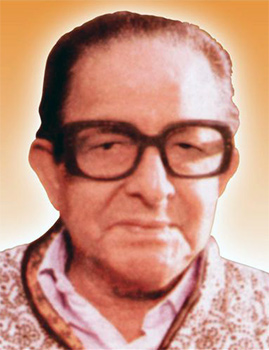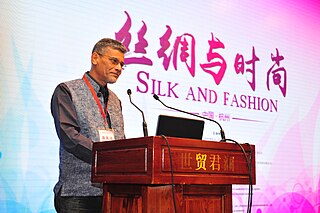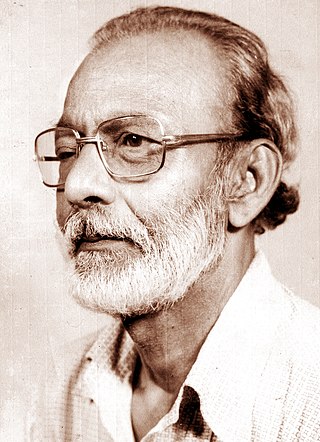
Barua is a common Assamese surname shared by the Assamese communities much like Aroras of Punjab.

Titabor is a town in the Jorhat district of Assam in India. It is about 20 km away from Jorhat City. It is one of the highly greeny places of Assam, surrounded by different tea-estates. The town serves as the administrative headquarters of the Thengal Kachari Autonomous Council.
Bhabendra Nath Saikia was a novelist, short-story writer, editor and film director from Assam, India. Saikia received his doctorate in physics from the University of London. He began his career as a reader in the Department of Physics, University of Guwahati. He later played an important role in the publication of college level textbooks in the Assamese language during his tenure as the Secretary of the Co-ordination Committee for production of textbooks in regional languages.

Joymoti is a 1935 Indian film widely considered to be the first Assamese film ever made. Based on Lakshminath Bezbaroa's play about the 17th-century Ahom princess Joymoti Konwari, the film was produced and directed by the noted Assamese poet, author, and film-maker Jyoti Prasad Agarwala, and starred Aideu Handique and acclaimed stage actor and playwright Phani Sarma. The film, shot between 1933 and 1935, was released by Chitralekha Movietone on 10 March 1935 1935 and marked the beginning of Assamese cinema.

Nabakanta Barua was a prominent Assamese novelist and poet. He was also known as Ekhud Kokaideu. As Sima Dutta he wrote many poems in his early life.

Balmiki Prasad Singh was the 14th Governor of Sikkim, India. He is a retired IAS officer and has written books and articles relating to Indian culture, in particular the culture of North-East India. Among his prominent books are Bahudha and the post 9/11 World and The problem of change: a study of North East India.

The Kamal Kumari National Award is an Indian Award given to individuals and groups in India for outstanding contribution to Art, Culture & Literature and Science & Technology. It was instituted by the Kamal Kumari Foundation in 1990 in memory of Kamal Kumari Barooah, the remarkable matriarch of the Khongiya Barooah family of Thengal, Assam. The foundation has till date a number of awardees. The first award was given to Sobha Brahma in 1991 in the category of Culture. The award carries a cash award of Rs. 200,000, a trophy and a citation.
The Siva Prasad Barooah National Award is an Indian award given to individuals and groups in India for outstanding contribution to journalism, to promote news media excellence. It was instituted by the Kamal Kumari Foundation in 1999 in memory of Siva Prasad Barooah, the renowned tea-planter, philanthropist, politician, humanist and also the publisher of Batori, the first Assamese daily newspaper in Assam. He belongs to the famous Khongiya Barooah family of Thengal, Assam. The first award went to The Assam Tribune. The award carries a cash award of ₹2 lakh, a trophy, a Chadar and a citation.

Siva Prasad Barooah (1880–1938) was a renowned planter, philanthropist, politician, and humanist from Assam. He was the pioneer or path-breaker in Assamese journalism who published Batori, the first daily newspaper in Assam. The Siva Prasad Barooah National Award, instituted in his fond memory, is being given to individual or group, by The Kamal Kumari Foundation since 1999, for outstanding contributions to the field of journalism. He belongs to the famous Khongiya Barooah family of Thengal, the family that emerged as the champion of Assamese interests and repository of Assamese Culture and traditions. He was the richest tea-planter at that time in India. He married Kamal Kumari Barooah in 1917 and noted Indian entrepreneur, tea planter and philanthropist Hemendra Prasad Barooah was his son.

Kamal Kumari Barooah (1899–1978) was the matriarch of the Khongiya Barooah family of Thengal, Assam. She was born to Mahendranath Mahanta and Swarnalata Mahanta at Borelengi Satra. In 1917, she married Siva Prasad Barooah of Khongiya Barooah family, the family that emerged as the champion of Assamese interests and repository of Assamese culture and traditions. Noted Indian entrepreneur, tea planter and philanthropist Hemendra Prasad Barooah was her son.
Debo Prasad Barooah was an Indian academician, author, historian and the former Vice-Chancellor (the Chief Executive) of Gauhati University. Barooah, highly regarded for his knowledge of political science and history of the region had a brilliant academic record beginning with his graduation in 1954.
Hemendra Prasad Barooah (1926–2013), was an Indian entrepreneur, tea planter and philanthropist known for his contributions to Assam tea and tourism industries. He was honoured by the Government of India, in 2013, that bestowed on him the Padma Shri, the fourth-highest civilian award, for his contributions to the fields of trade and industry.
Patricia Mukhim is an Indian social activist, writer, journalist and the editor of Shillong Times, known for her social activism. A recipient of honours such as Chameli Devi Jain award, ONE India award, Federation of Indian Chambers of Commerce and Industry FLO award, Upendra Nath Brahma Soldier of Humanity award, Siva Prasad Barooah National award and North East Excellence award, she was honored by the Government of India, in 2000, with the fourth highest Indian civilian award of Padma Shri.
Joyanti Chutia is an Indian physicist who specializes in solid-state physics and plasma physics. She was among the first women who have headed scientific institutions in India when she became the Director of the Institute of Advanced Study in Science and Technology in Guwahati, Assam, which is the first major research institution in North East India. She is a fellow of National Academy of Sciences. She is an Emeritus Scientist at the Department of Science & Technology in the Government of India.
Arup Kumar Datta is an Indian writer and Journalist from Guwahati, Assam. He has written 18 books for adults and 17 adventure novels for young people. In 2014 he was awarded the Life Time Achievement Honour by Association of Writers and illustrators for Children, New Delhi, the Indian chapter of the International Board of Books for Young People. He has also won numerous awards including the Shankar's Award in 1979, conferred to mark The International Year of the Child. He has been awarded the civilian award Padma Shri by Government of India in 2018.
Sobha Brahma was an Indian painter and sculptor. He lived and worked in Guwahati. He graduated from the Kalabhavana Visva-Bharati University Shantiniketan West-Bengal. Brahma developed a unique individual style that mixed traditional folk and modern Indian art.
Sangeeta Barooah Pisharoty is an Indian journalist and writer from the state of Assam, based in the city of New Delhi. Currently the National Affairs Editor with the digital news publication The Wire, she was formerly a special correspondent of the English language national newspaper The Hindu. She has been the subject of widespread critical acclaim for the documentation on the Assam Movement, the Assam Accord and the insurgencies in Assam in her debut book Assam: The Accord, The Discord.

Dilip Barooah was an Assamese author and Social Entrepreneur who is credited to be the pioneer of manufacturing of Eri Silk in the North East of India.

Asu Dev(আশু দেব), born as Ashutosh Deb Dhubri, Assam, India was a pioneer artist of Assam. He was a painter, sculptor and an Art Educator. During his lifetime he had worked as a Textile Designer in several Cotton Mills in Jessore and Khulna in Bangladesh, Ahmedabad, Surat, Kolkata, at the Janata College Titabor Assam and Assam Textile Institute Guwahati, Assam and at Weavers Training Centre in Dimapur Nagaland in the later part of his life. His distinguished style of painting, where he had experimented using fine and minute dots often like modern pixels, which was often addressed by art critics as pointillism. Asu Dev was a self taught artist who created his artworks from minute observation of the Nature and the working class, and his innate exposure to Srimanta Sankardeva the 15th–16th century Assamese saint-scholar, poet, playwright, artist and social-religious reformer. The miniature paintings from the Chitra Bhagawata and the traditional folk arts and culture of the region, becoming the prime subjects of his paintings. During his career spanning about fifty years of Artistic career dating to the 1930s, he had created around 180 Art works, mostly paintings, oil on canvas, water colour tempara, textile designs and motifs, illustrations, sketches, drawings and a few sculptures. In 1952, Asu Dev was among the first artists to hold, one man show in Assam.









